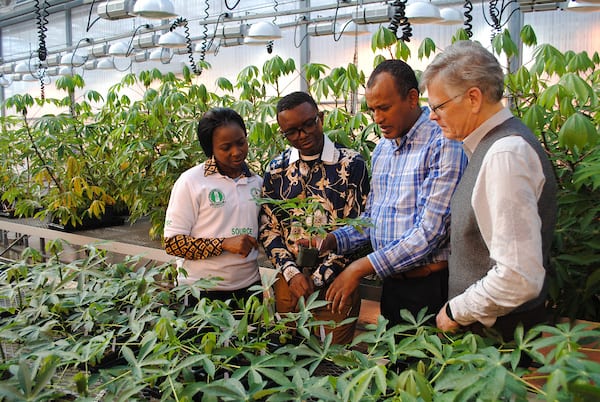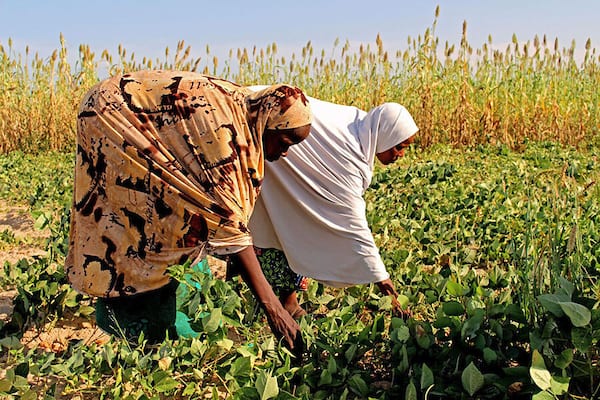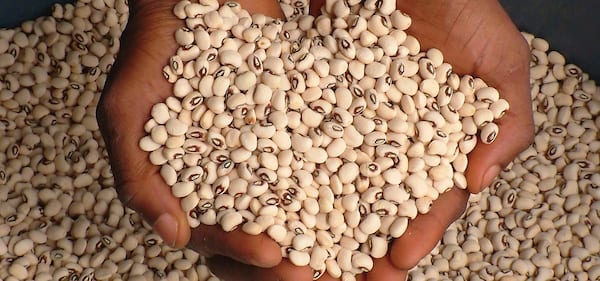New Pest-Resistant Black-Eyed Peas Set to Bring Food Security to Nigeria
Imagine toiling in the field all year only to have your crop fail. This is the current reality for many farmers in Nigeria, but perhaps not for long…
We know them as black-eyed peas in the U.S., but cowpeas (Vigna unguiculata), or simply “beans” as they are called by most Nigerians, are an important food crop in most of sub-Saharan Africa. More than 200 million people depend on them for their daily dietary protein. Nigeria is the world’s largest producer, growing more than sixty percent of the world’s output.
Cowpea tolerates drought and poor soils, and like many legumes, fixes its own nitrogen. However, the crop is susceptible to pod borer insects with losses up to 80 percent when attacked. To keep the insects at bay, Nigerian farmers spray pesticides six to ten times throughout the growing season, often with no protective gear, at substantial expense and risk to their health.

Representatives from partner organizations visited St. Louis in December. From left: Rebecca Mewase of the National Agricultural Seeds Council; Francis Nwankwo, PhD, of the African Agricultural Technology Foundation; Getu Duguma, PhD, and Don MacKenzie, PhD, both of the Danforth Center.
Historic News
A historic milestone was reached last year when Nigeria approved a new pod-borer resistant (PBR) cowpea. Developed by an international team with the Danforth Center providing regulatory support, PBR cowpea was approved following a decade-long safety review by local scientists and has been registered and named “SAMPEA 20-T” by the National Committee on Naming, Registration, and Release of Crop Varieties of Nigeria on December 12, 2019.
“With PBR cowpea, not only will yields increase dramatically,” said the Danforth Center’s Donald MacKenzie, PhD, who led the regulatory submission process. “But farmers can significantly reduce pesticide use, which will benefit farmers’ health, as well as the environment.”

Black-eyed peas, or cowpeas, are drought-resistant and tolerate poor soils, but they are susceptible to pod-borer insects. A new publicly developed variety will increase yields while reducing the need for expensive and dangerous pesticides.
Building Capacity
Representatives from partner organizations recently visited the Danforth Center’s Institute for International Crop Improvement (IICI). Tolulope Rebecca Mewase of the National Agricultural Seeds Council (NASC), Nigeria, and Onyekachi Francis Nwankwo, PhD, of the African Agricultural Technology Foundation (AATF), were hosted by the Danforth Center’s Institute for International Crop Improvement (IICI) for two weeks in early December.
A senior molecular scientist, Mewase was in St. Louis to receive advanced laboratory training. Her organization is tasked with creating the certified PBR cowpea seed slated for sale later this year to farmers. “Whatever we need to achieve in the laboratory, we can learn how to do it here at the Danforth Center,” she said.
Dr. Nwankwo, whose organization developed PBR cowpea, notes that success would not have been possible without Danforth Center’s regulatory assistance. “The Danforth Center guided us through conducting the regulatory trials and writing dossiers for submission,” said Dr. Nwankwo. “They trained us on how to engage with the regulators, taught us the regulatory language. Involvement of the Danforth Center was really critical for the success not only of this project, but for the success of regulatory science in Africa generally.”

Black-eyed peas are a staple food for more than 200 million people in sub-Saharan Africa. A new pest-resistant variety was approved last year with Danforth Center regulatory support.
Next Steps
With the help of the Danforth Center’s IICI, the PBR cowpea team has prepared a regulatory dossier for Ghana and plans to submit it soon. Field trials are underway in Malawi and have recently concluded in Burkina Faso, and regulatory applications are planned for those countries as well.
Adds Dr. Nwankwo: “Most of the population of sub-Saharan Africa does not have access to animal protein. In Hausa, the name of cowpea is literally ‘meat for the poor.’ Cowpea is a crucial source of dietary protein and a pest-resistant variety is a vital step toward food security.”